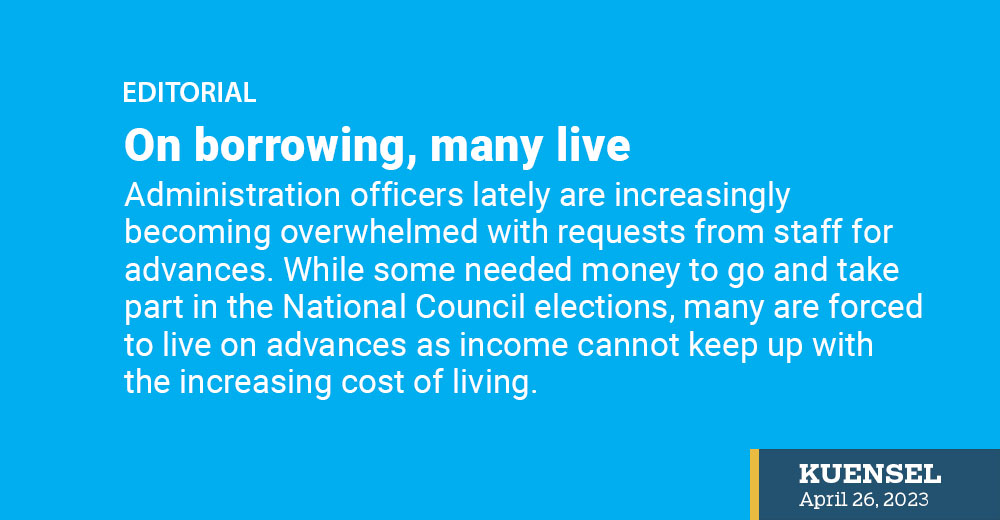Administration officers lately are increasingly becoming overwhelmed with requests from staff for advances. While some needed money to go and take part in the National Council elections, many are forced to live on advances as income cannot keep up with the increasing cost of living.
With the significant drop in fuel price recently, the expectation was that the price of food would drop. Dependent entirely on imports – from salt and cooking oil to rice, a rise or fall in the price of food has a huge bearing on the cost of living. It seems drop in the cost of fuel had no impact on the cost of transportation and thereby food.
Latest statistics available on consumer goods and services states that it increased by 4.27 percent in February compared to the same month last year. For non-food items, the rate of increase dropped at 6.32 percent, but for food, it increased by 1.91 percent. Transport was the main driver with a 10.50 percent increase in February. Price of fuel, especially diesel dropped by Nu 13 a litre, a big drop to immediately impact the cost of goods. However, the benefit has not trickled down to consumers.
That cost of housing has gone down after the Australian exodus has made those looking for affordable housing angry. Housing is still expensive and there is still a shortage, especially affordable ones.
Some of our policy decisions or external factors that drive prices are not translating into benefits. The government, to bring down cost, slashed customs duty on third-country imports to 10 percent or zero, in some, from up to 50 percent two years ago. The revision covered about 500 items including a long list of essentials that had been out of reach for many or made expensive because of the high duties imposed.
Did the revision bring down the price? No, says all, including retailers who blame suppliers who blame distributors. It seems that the revision benefited only those in the “container” business importing from as far as China, Singapore, or Indonesia. Many blamed the high cost of diesel that fueled trucks bringing goods from the seaports to Phuentsholing and other parts of the country. Diesel is cheaper by Nu 13 a litre. The price of Samyang noodles, a favorite among many children, for instance, has increased after the duty revision and drop in fuel price.
The National Statistical Bureau, which provides regular statistics to support evidence-based decision making, will highlight the price of fuel in its next report. As of now, the drop in fuel price has not benefited the average end consumers. Perhaps, the evidence has not helped decision-making or our decision makers didn’t care to intervene even with the statistics.
Meanwhile, the talks of a pay revision, convinced by the formation of the 5th Pay Commission, has already created an expectation. What many didn’t expect is the rise in the price of essentials and housing.
Until then, those in the salaried group will have to live on borrowing or advances.


